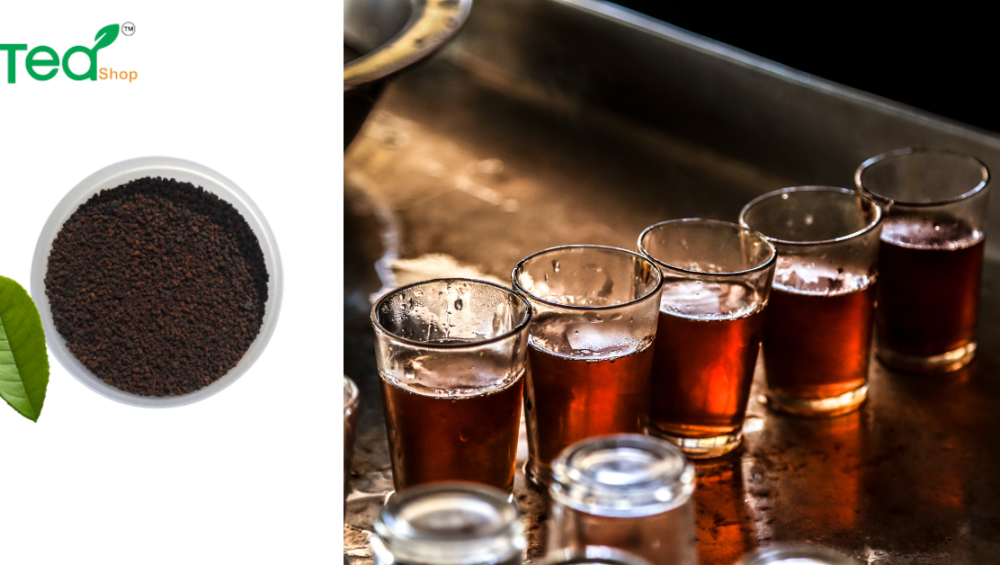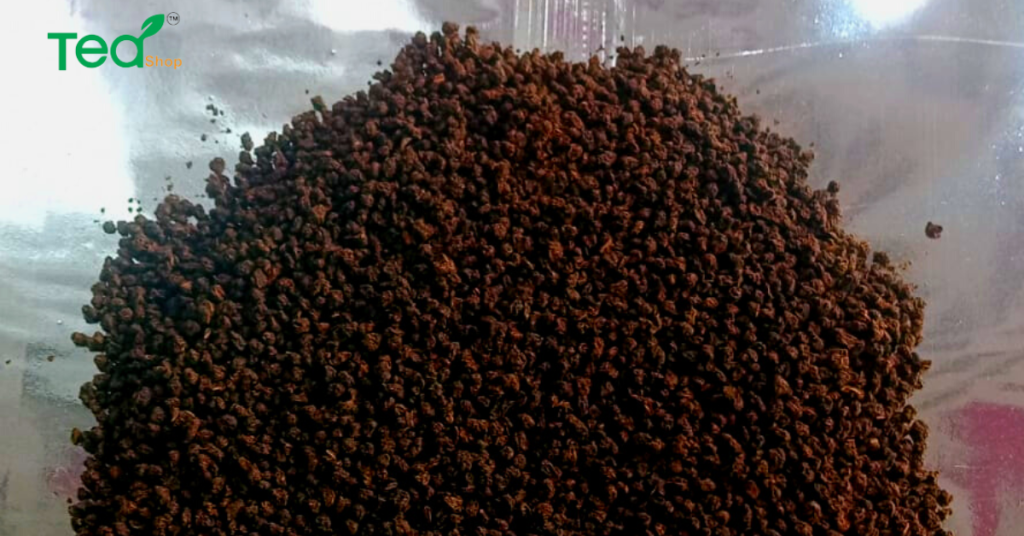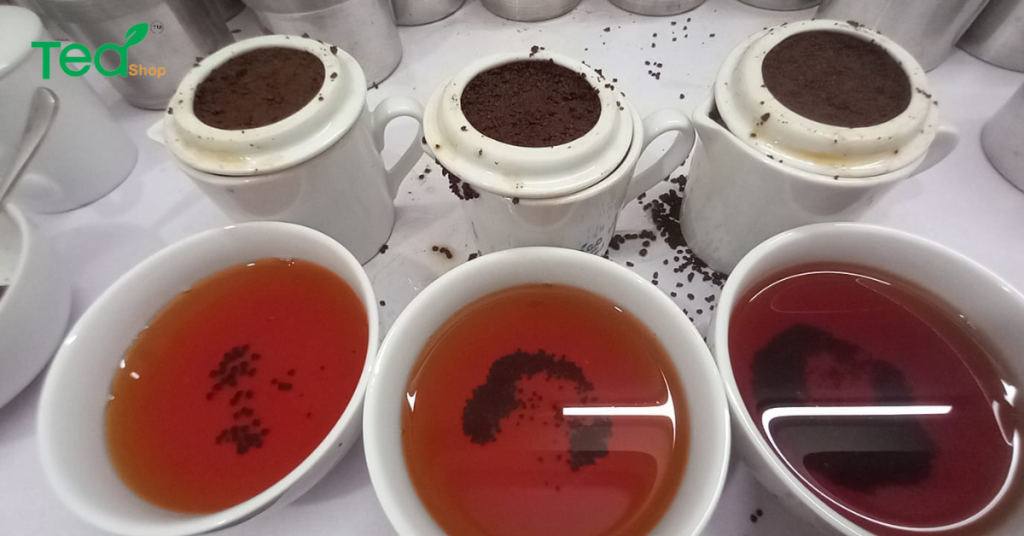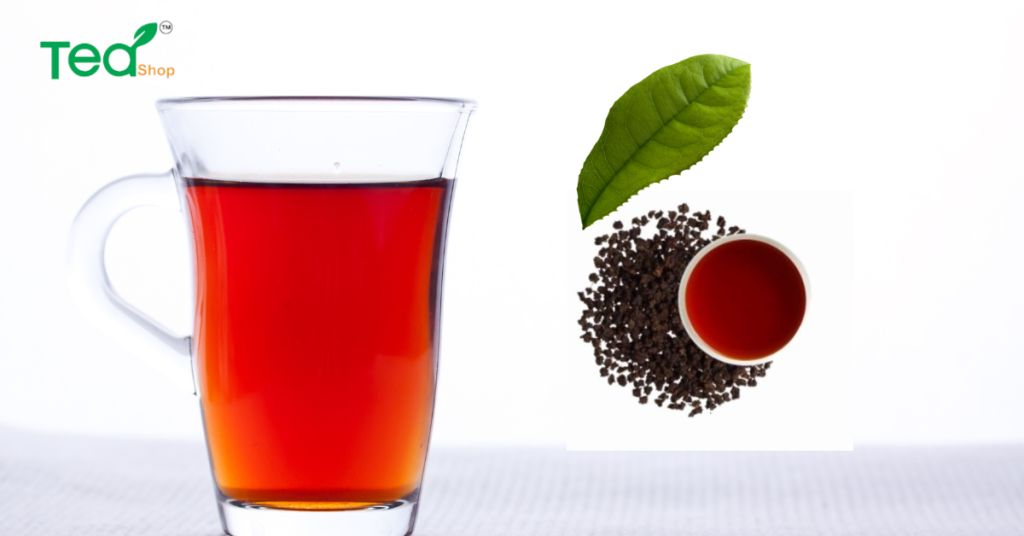Black Tea
Black tea is a type of tea that is fully fermented and has a strong, robust flavor and a dark color. It is made from the Camellia sinensis plant, just like green tea, white tea, and oolong tea. Some popular varieties of black tea include Bangladesh, Darjeeling, Assam, Ceylon, and Earl Grey. Black tea is often served plain, but it can also be flavored with ingredients like spices, fruit, or flowers. It is a popular beverage all over the world, and is often consumed with milk and sugar to balance out its bold flavor. It is also sometimes used as a base for iced tea or mixed with other ingredients to make cocktails.
Black Tea Overview
Black tea is a type of tea that is widely popular all over the world and is known for its strong, bold flavor and dark color. It is made from the leaves of the Camellia sinensis plant, and it is the most processed type of tea. The processing of black tea involves withering the leaves, rolling them to break down the cell walls, and then fully fermenting the leaves to develop their flavor and color.
Black tea is rich in antioxidants, which can have a number of health benefits, such as reducing the risk of heart disease and certain types of cancer, and improving gut health. Black tea also contains caffeine, making it a popular choice for a morning or afternoon pick-me-up.
There are several popular varieties of black tea, including Darjeeling, Assam, Ceylon, and Earl Grey. Darjeeling is grown in the Darjeeling district of West Bengal, India, and is known for its musky and floral flavor. Assam is grown in the Assam region of India, and is known for its strong and malty flavor. Ceylon is grown in Sri Lanka, and is known for its robust and full-bodied flavor. Earl Grey is a flavored black tea that is scented with bergamot oil, giving it a citrusy and floral flavor.
Black tea is traditionally enjoyed plain, but it can also be flavored with ingredients like spices, fruit, or flowers. It is often consumed with milk and sugar to balance out its bold flavor, and it is also sometimes used as a base for iced tea or mixed with other ingredients to make cocktails.
Black Tea Benefits
Black tea has a number of potential health benefits, due to its high concentration of antioxidants and other beneficial compounds. Some of the most notable benefits include:
- Reduced risk of heart disease: The antioxidants in black tea may help to reduce the risk of heart disease by decreasing the levels of bad cholesterol and improving the health of blood vessels.
- Improved gut health: The polyphenols in black tea may help to improve gut health by promoting the growth of healthy gut bacteria and reducing inflammation.
- Decreased risk of certain types of cancer: The antioxidants in black tea may help to decrease the risk of certain types of cancer, such as ovarian and breast cancer, by inhibiting the growth of cancer cells.
- Boosted immune system: Black tea contains compounds that may help to boost the immune system, helping to protect the body against disease.
- Improved mental alertness: Black tea contains caffeine, which can help to improve mental alertness and concentration.
- Reduced stress: Theanine, an amino acid found in black tea, may help to reduce stress and improve relaxation.
It is important to note that while black tea has many potential health benefits, it should still be consumed in moderation as part of a balanced diet. Additionally, some people may be sensitive to caffeine or other compounds in black tea, so it is always a good idea to talk to a healthcare professional before making any major changes to your diet.
black tea caffeine
Black tea contains caffeine, which is a natural stimulant that is commonly consumed for its ability to increase alertness and improve focus. The amount of caffeine in black tea can vary depending on factors such as the type of tea, the brewing method, and the serving size.
On average, a cup of black tea contains about 40-60 milligrams of caffeine. This is less than the average amount of caffeine in a cup of coffee, which is about 95 milligrams. However, the amount of caffeine in black tea can vary widely, and some types of black tea, such as Assam or strong breakfast blends, can contain higher amounts of caffeine.
It is important to note that the amount of caffeine in black tea can be influenced by a number of factors, including the time of day when the tea was harvested, the altitude at which the tea was grown, and the processing method used to make the tea.
Caffeine can have both positive and negative effects on the body, and it is important to consume it in moderation. If you are sensitive to caffeine or have any medical conditions that may be affected by caffeine, it is always a good idea to talk to a healthcare professional before making any changes to your diet.
Black Tea Category
Black tea is a category of tea that is fully fermented and has a strong, robust flavor and a dark color. It is one of the four main categories of tea, along with green tea, white tea, and oolong tea, and is made from the leaves of the Camellia sinensis plant.
Black tea is the most processed type of tea, and the processing method involves withering the leaves, rolling them to break down the cell walls, and then fully fermenting the leaves to develop their flavor and color. The fully fermented leaves are then dried to produce the final product.
Black tea is known for its bold, rich flavor, and it is often consumed plain or with milk and sugar to balance out its strong taste. There are many different varieties of black tea, each with its own unique flavor profile, and some popular examples include Bangladesh, Darjeeling, Assam, Ceylon, and Earl Grey.
Black tea is widely popular all over the world, and is often consumed as a hot beverage, as well as being used as a base for iced tea or mixed with other ingredients to make cocktails. It is also sometimes consumed for its potential health benefits, as it contains antioxidants and other beneficial compounds.
CTC Black Tea
CTC black tea is a type of black tea that is made using a specific processing method called “Crush, Tear, and Curl” (CTC). This method involves breaking down the tea leaves into smaller pieces, which allows for faster and more complete fermentation and results in a strong, robust flavor and dark color.
CTC black tea is commonly used in tea blends, especially for mass-produced tea bags. It is known for its strong, robust flavor, and it is often used as a base for tea blends or as a substitute for coffee.
The CTC method of processing black tea was developed in the 1930s, and it is now widely used in tea-producing countries such as India and Sri Lanka. CTC tea is typically made from younger tea leaves and is often considered to be of lower quality than orthodox tea, which is made using a different processing method.
While CTC black tea has a strong, robust flavor that is well suited for tea blends and tea bags, it may not be as flavorful or nuanced as other types of black tea, such as orthodox black tea or specialty black teas like Darjeeling or Ceylon. However, CTC black tea is still a popular choice for many people due to its strong flavor and convenient packaging options.
Black Tea Price In Bangladesh
The price of black tea in Bangladesh can vary widely depending on a number of factors, including the quality of the tea, the brand, and the location where it is purchased.
In general, black tea in Bangladesh can range in price from around 25 to 50 Bangladeshi taka (approximately $0.30 to $0.60 USD) per kilogram for lower-quality tea to several hundred taka per kilogram for high-quality, specialty teas.
The price of black tea can also be influenced by factors such as the time of year, local economic conditions, and the availability of the tea. Additionally, prices can vary widely between different regions of Bangladesh, and between different tea shops and retailers.
It is important to note that while the price of black tea can be an important consideration, it is not the only factor to consider when choosing a tea. The quality of the tea, the source of the tea, and the processing method used to make the tea can all have a significant impact on the taste and health benefits of the tea, and should be taken into account when making a purchase.









